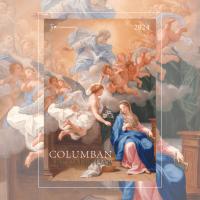How a remarkable young Columban is using music to engage with residents of a poor Lima neighbourhood.

Columban Fr. Gabriel Rojas is using music to engage with residents in Lima. Photo: St Columbans Mission Society
“Memories Are Made Of This”, go the words of the old song. Well, this certainly is the case with Father Gabriel Rojas, a Columban from Peru who for many years has brought the wonders of God and Creation into the lives of parishioners in the deprived outskirts of Lima, Peru’s capital, through the sound of the music of his folk group “Memorias” (”Memories”, in English).
Music is in Gabriel’s blood. He was born and raised to the notes of song and guitar. From his home in the high Andes to the teeming cities of Pakistan and now to the poverty-stricken “barrios” of Lima, music has been his constant companion. Moreover, it has served him as an indispensable pastoral tool.
His choice of title “Memorias” for the band is significant. His musical style is based on the enchanting melodies of his native home. “Music is part of the DNA of my family”, explains Gabriel. He is from humble peasant farming stock in the Andean province of Cajamarca (where Pizzaro famously captured the Inca ruler Atahualpa and, in taking him, took an empire for Spain), the fifth of six children born to Serafín and Francisca.
Gabriel recalls how, from 5.30 a.m. each day, his parents laboured – Serafín in the fields and Francisca at the loom. (His mother is an expert weaver, transforming locally produced cotton and wool into cloaks, bags and ponchos. She continues to do so today, albeit well into her nineties.)
From this happy family background came love of God, love of nature and……love of music. “As far back as I can remember there was the sound of a guitar”, remembers Gabriel fondly. His late father loved to sing. “From when he mounted his horse to leave, until his return in the evening, you could hear him singing. He could be heard for miles. He was the best singer of my village. His voice could make the mountains tremble”.
Serafín was also a catechist in the village chapel, where he led the choir. Gabriel imitated him in everything. “At 13 I made my first flute out of bamboo”, something he’d seen Dad do. He began to play the guitar. “There were no formal music lessons. You just learnt by watching”. At 18, he was composing. When he entered seminary, the Columbans encouraged him, seeing his musical talent as a valuable means of evangelization.
By the time he was ordained a priest he had formed “Memorias”. Apart from guitars, the favoured instruments were the traditional Andean ones of “charango”, “zamponia” and “quena” – kinds of banjo, harp and flute respectively. According to Gabriel, the notes they blend, “evoke the relationship of the mountain-dweller with the trees, the animals, water, sun and wind”, all the glories of God’s Creation.
As part of his missionary service, Gabriel was appointed to Pakistan, where he spent seven years. This could have put paid to his music career, but just the opposite. In between ministering to the tiny groups of Catholics in this overwhelmingly Islamic country, he took the opportunity to enrich his repertoire by immersing himself in Eastern music. He began practising with unfamiliar instruments, such as the sitar. In so doing, “I was filled with emotion. It confirmed for me that music comes directly from God”.

‘Memorias’ playing at a Catholic Youth Festival. Photo: St Columbans Mission Society
Returning to Peru, he re-formed “Memorias” and now mixed traditional Andean sounds with Eastern ones, something that gives the group its unique style. The band was soon much in demand. Cassettes and audios were produced. The word spread.
Appointed to an underprivileged area on the edge of Metropolitan Lima, Gabriel and his “Memorias” became a familiar aspect of the local Church scene, touching people – and especially the young – in ways that more conventional pastoral methods could not.
“This is what music means to me as a missionary”, affirms Gabriel. “It is a form of pastoral work with opportunities and demands that go further than mere sacramental preparation. It is a space where people can grow and develop and find themselves during their journey through life. It is a school of values.”
It also gives a great deal of pleasure to people. The sort of pleasure we´ll be so much in need of in our post-coronavirus world. The pleasure that comes from the Sound of Music.
Fr John Boles SSC
Father John Boles SSC comes from England and has worked in South America for the last 25 years.
Father Gabriel Rojas SSC ministers in the parish of “Los Santos Arcangeles” (“The Holy Arcangels”) in the Diocese of North Lima.
View some of the “Memorias” music on YouTube:


